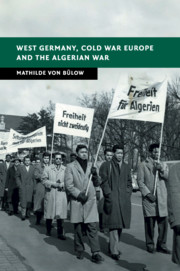Book contents
- Frontmatter
- Contents
- Acknowledgements
- List of abbreviations
- Introduction
- 1 Internationalising colonial warfare: FLN strategy and French responses
- PART I CREATING THE SANCTUARY: NOVEMBER 1954–MAY 1958
- 2 West German diplomacy and the Algerian war
- 3 The FLN's implantation in West Germany
- 4 Algeria and West German opinion
- 5 FLN contraband in West Germany
- PART II CONTESTING SANCTUARY AND SOVEREIGNTY: JUNE 1958–DECEMBER 1960
- PART III ASSERTING SOVEREIGNTY: JANUARY 1961–JULY 1962 AND BEYOND
- Conclusion
- Glossary of foreign terms
- Bibliography
- Index
4 - Algeria and West German opinion
from PART I - CREATING THE SANCTUARY: NOVEMBER 1954–MAY 1958
Published online by Cambridge University Press: 05 September 2016
- Frontmatter
- Contents
- Acknowledgements
- List of abbreviations
- Introduction
- 1 Internationalising colonial warfare: FLN strategy and French responses
- PART I CREATING THE SANCTUARY: NOVEMBER 1954–MAY 1958
- 2 West German diplomacy and the Algerian war
- 3 The FLN's implantation in West Germany
- 4 Algeria and West German opinion
- 5 FLN contraband in West Germany
- PART II CONTESTING SANCTUARY AND SOVEREIGNTY: JUNE 1958–DECEMBER 1960
- PART III ASSERTING SOVEREIGNTY: JANUARY 1961–JULY 1962 AND BEYOND
- Conclusion
- Glossary of foreign terms
- Bibliography
- Index
Summary
The 1950s are often depicted in historiography as a decade marked by parochialism, insularity and political apathy in West Germany. After the traumas generated by mass political participation during the Third Reich, civil society retreated into work and the home, paying little attention to politics or international affairs. To historian Wolfram Hanrieder, this view of the 1950s is a myth. Precisely because of their own recent past, he argued, most Germans possessed a sharp ‘sense of the significance of international politics for the routines of daily life’. With their country occupied, divided, and at the frontline of the European Cold War, Germans perceived foreign policy as ‘an all-embracing existential experience’. In a similar vein, historian Eckart Conze argues that the quest for security became the defining feature of West Germany, permeating every aspect of life and society and remaining at the heart of debates about the country's reintegration into international society. By the late 1950s, these debates had led to the emergence of small but articulate protest movements opposing rearmament (Ohne Mich) and nuclear weapons (Kampf dem Atomtod). West German civil-society actors thus did take an interest in matters of foreign and security policy, though their political engagement tended to centre on issues closer to home.
The Third World, meanwhile, did not become a focal point of civic engagement or protest in West Germany until the late 1960s, influenced especially by events in Vietnam. Only then did a younger generation of civil-society actors associated with the New Left and extra-parliamentary opposition become engaged in debates about imperialism and neo-imperialism. Some scholars have nonetheless argued that a small minority of mostly left-wing activists had begun to take an interest in decolonisation in the late 1950s already. Of all the colonial conflicts that marked that decade, they single out Algeria's independence struggle as the one that laid the foundations of the West German Third World movement. What remains less clear is just how and why these actors became aware of the Algerian war? What role did the FLN and French authorities play in this process? And was it really only a small group of left-wing activists that took an interest in that conflict? Answering these questions is the main purpose of this chapter.
- Type
- Chapter
- Information
- West Germany, Cold War Europe and the Algerian War , pp. 104 - 128Publisher: Cambridge University PressPrint publication year: 2016



